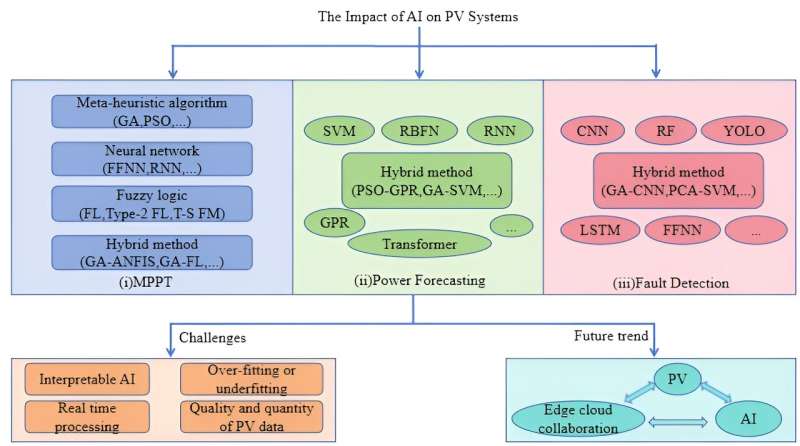Review reveals impact of integrating artificial intelligence technologies into photovoltaic systems – Tech Xplore
Review reveals impact of integrating artificial intelligence technologies into photovoltaic systems
Artificial intelligence is poised to bring photovoltaic systems into a new era through revolutionary improvements in efficiency, reliability, and predictability of solar power generation.
In their paper published in CAAI Artificial Intelligence Research, a research team from Chinese and Malaysian universities explored the impact of artificial intelligence (AI) technology on photovoltaic (PV) power generation systems and their applications from a global perspective.
“The overall message is an optimistic outlook on how AI can lead to more sustainable and efficient energy solutions,” said Xiaoyun Tian from Beijing University of Technology. “By improving the efficiency and deployment of renewable energy sources through AI, there is significant potential to reduce global carbon emissions and to make clean energy more accessible and reliable for a broader population.”
The team, which included researchers from Beijing University of Technology, Chinese Academy of Sciences, Hebei University, and the Universiti Tunku Abdul Rahman, focused their review on pivotal applications of AI in maximum power point tracking, power forecasting and fault detection within PV systems.
The maximum power point (MPP) refers to the specific operating juncture where a PV cell or an entire PV array yields its peak power output under prevailing illumination conditions. Tracking and exploiting the point of maximum power, mainly by adjusting the operating point of the PV array to maximize output power, is an important problem in solar PV systems. Traditional methods are plagued by defects, resulting in issues like reduced efficiency, wear on hardware and suboptimal performance during sudden weather changes.
The researchers reviewed publications demonstrating how AI techniques can achieve high performance in solving the MPP tracking problem. They compiled publication methods that presented both single and hybrid AI methods to solve the tracking problem, exploring the advantages and disadvantages of each approach.
The team reviewed publications that presented AI algorithms applied in PV power forecasting and defect detection technologies. Power forecasting, which refers to predicting the production of PV power over a certain incoming period, is crucial for PV grid integration because the share of solar energy in the mix increases every year as well as the PV generation has intermittent nature that may impact the grid stability.
Fault detection in PV systems can detect and locate various types of failures in the PV system, such as environmental changes, panel damage and wiring failures. For large-scale PV systems, traditional manual inspection is almost impossible and passive. AI algorithms can step in where manual inspection falls short, identifying deviations from normal operating conditions that may indicate faults or anomalies proactively.
The research team combed through the literature that presented single and hybrid AI methods to solve both problems. By comparing AI-driven techniques, the team explored and presented advantages and disadvantages of each approach.
While integrating AI technology optimizes and improves the operational efficiency of PV systems, new challenges continue to arise. These challenges are driven by issues such as revised standards for achieving carbon neutrality, interdisciplinary cooperation, and emerging smart grids.
The researchers highlighted some emerging challenges and the need for advanced solutions in AI, such as transfer learning, few-shot learning and edge computing.
According to the paper’s authors, the next steps should focus on further research directed towards advancing AI techniques that target the unique challenges of PV systems; practical implementation of AI solutions into existing PV infrastructure on a wider scale; scaling up successful AI integration; developing supportive policy frameworks that encourage the use of AI in renewable energy; increasing awareness about the benefits of AI in enhancing PV system efficiencies; and ultimately aligning these technological advancements with global sustainability targets.
“AI-driven techniques are essential for the future development and widespread adoption of solar-energy technologies globally,” Tian said.
Additional study contributors include Jiaming Hu, Kang Wang and Dachuan Xu from Beijing University of Technology; Boon-Han Lim from Universiti Tunku Abdul Rahman; Feng Zhang from Hebei University; and Yong Zhang from Shenzhen Institute of Advanced Technology, the Chinese Academy of Science.
More information:
Jiaming Hu et al, A Comprehensive Review of Artificial Intelligence Applications in the Photovoltaic Systems, CAAI Artificial Intelligence Research (2024). DOI: 10.26599/AIR.2024.9150031
Provided by
Tsinghua University Press
Citation:
Review reveals impact of integrating artificial intelligence technologies into photovoltaic systems (2024, June 12)
retrieved 12 June 2024
from https://techxplore.com/news/2024-06-reveals-impact-artificial-intelligence-technologies.html
This document is subject to copyright. Apart from any fair dealing for the purpose of private study or research, no
part may be reproduced without the written permission. The content is provided for information purposes only.
Explore further


